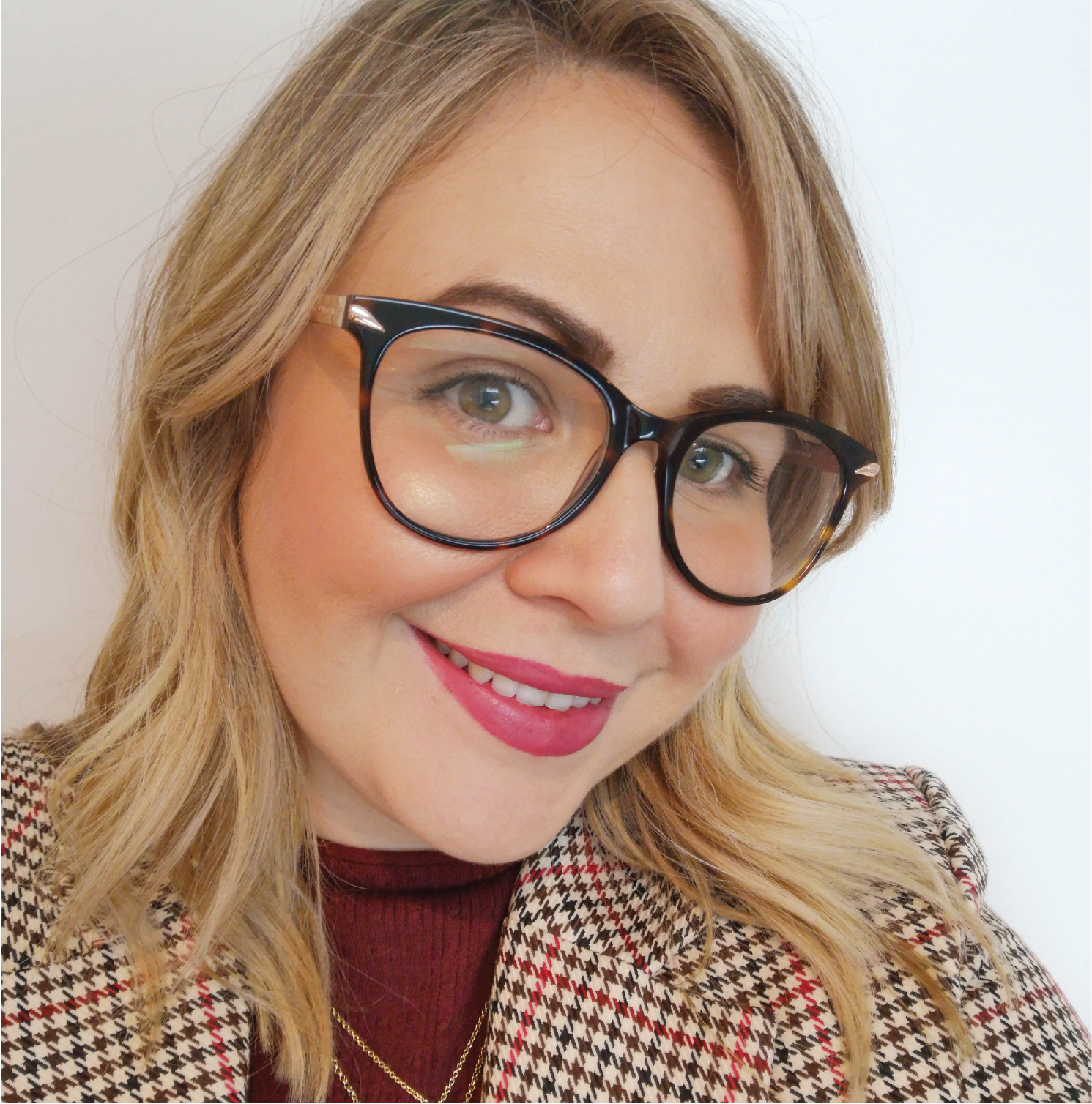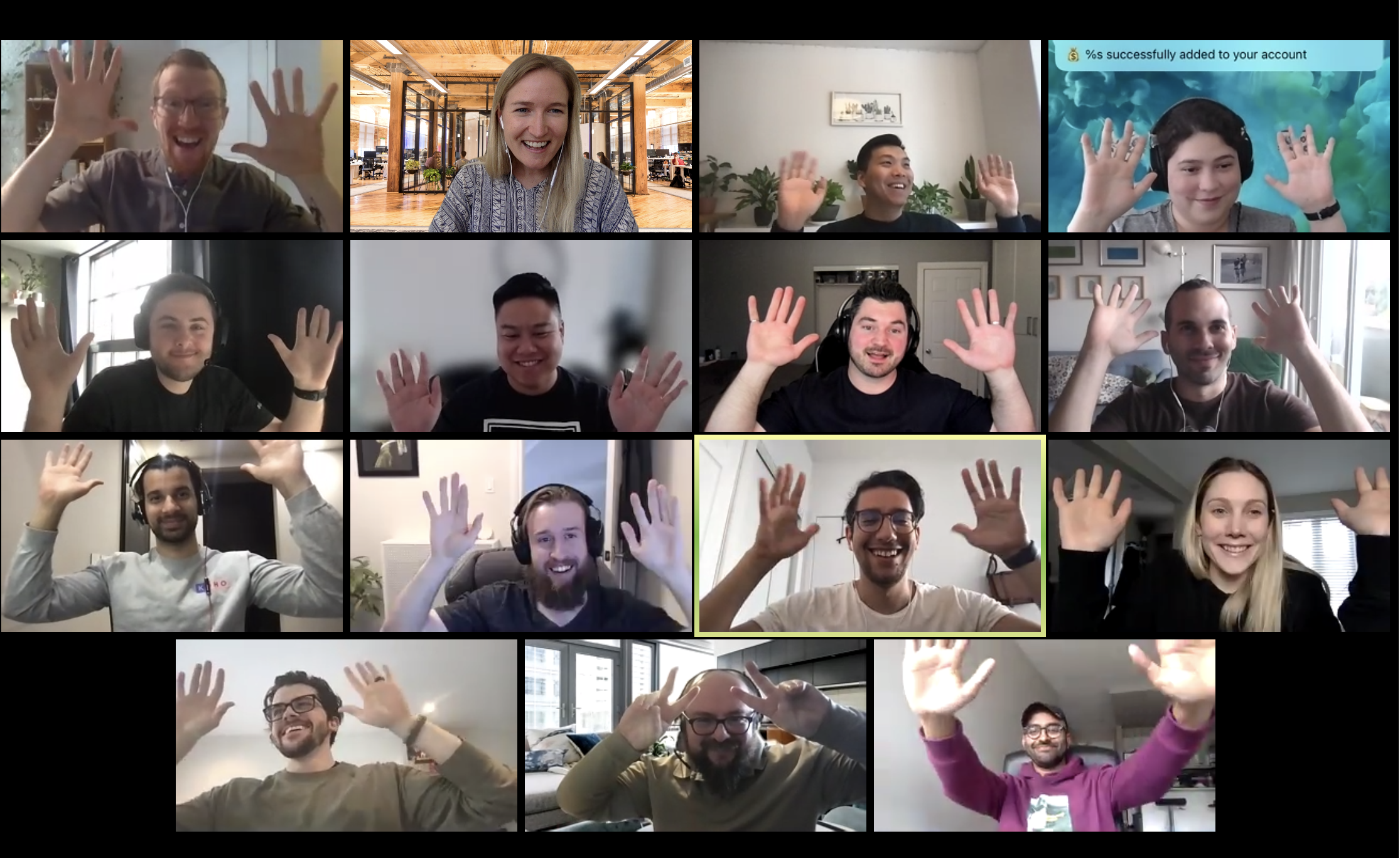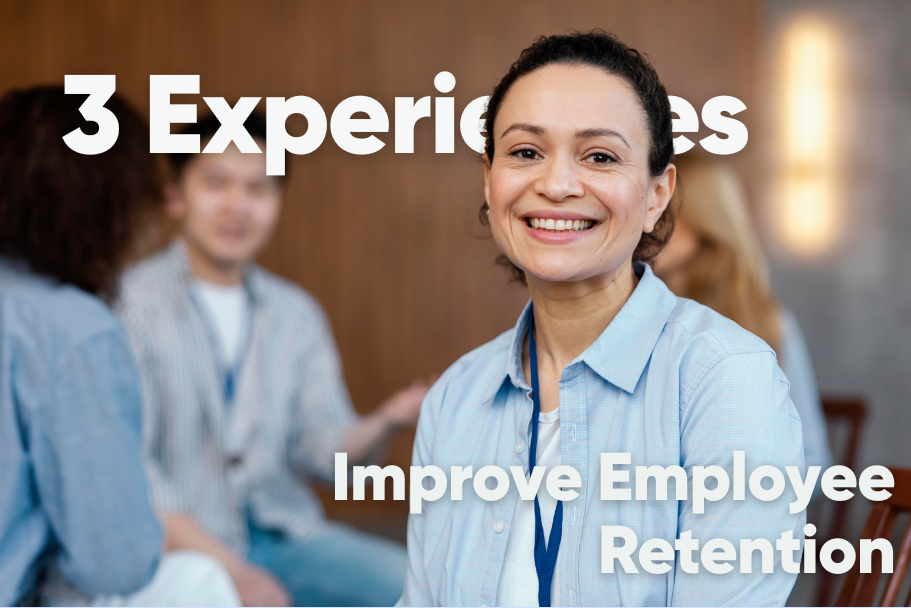
Lauren: To kick things off, can you tell me about the coaching program & the purpose of it?
Vicki: The purpose of the coaching program at KOHO is to optimize the performance of our employees and support them to be their best. When you're working at a fast-moving tech company like KOHO where things are constantly changing, it can be really intense and it can be stressful at times. At KOHO, we're not blind to that. Then you layer on Covid and it's inevitable for people to be facing ups and downs. The coaching program is designed to support people through these ups and downs so they have every opportunity to thrive and really be their best selves at work and at home. What we've found is that it's really a standout benefit for attracting and retaining talent. Gone, are the days where you can have your beer fridge, your ping pong table and stand out as an employer. People want to know they're truly being invested in beyond those health benefits, the nice laptop and ability to work from home which is sort of tablestakes at this point. Employees want to know that their growth is going to be fostered and that they'll have the support they need in a rapidly scaling company and that's what the coaching program is designed to do.
The program has 3 components and the first one, the main one, is 1-on-1 performance coaching. Coaches offer confidential coaching to everyone at the company. It doesn't matter what team you're on, what level of the company you're at, or what stage of you're career you're at, it is truly available to everyone. We offer team coaching as well, which has really taken off during Covid when we've had a lot of change in our teams and leaders are trying to figure out how to build cohesion and performance in a remote setting. And then the last element of the program is learning and development offerings.
Lauren: What makes in-house coaching more valuable than let's say, outsourcing it?
Vicki: The idea of in-house coaching really came from our CEO, Dan. He's always believed in coaching and has always worked with coaches to help him get to where he is and he wanted his employees to have the same benefits. Instead of giving people their own allowance to go out and find their own coach, he felt it was really important to bring coaches in-house for a couple of reasons:
Number one is, our coaches have the context for what's going on with the business. Our coaches are bought into what we're upto as a business, what our mission and vision is and it's helpful to have that context going into supporting everyone in the organization. There's also a really nice element to in-house coaches that you just can't get with external coaches, it's a way to embed our values at the grass roots levels. Instead of just having our values on our website or our walls, our values become a backdrop in every coaching interaction.
For example, if somebody comes to us and they're working through a really difficult situation with a colleague and they need to have a really difficult conversation but aren't sure how to go about doing that, we channel what we know about one of our core values around practicing and fostering candor. We walk the employee through what it means to be radically candid and what would that look like in this situation and we give them the tools and the language they need to move forward. It's a really powerful way to inject those values.
And then lastly, it's a really helpful way to get real-time feedback and perspective on what's going on with people. Instead of waiting for the bi-annual or quarterly engagement survey results to come back and get that pulse check on what's working and what's not, having these ongoing coaching conversations every week, allows us as a team of coaches to filter our the macro themes and trends that we're seeing across the organization and make recommendations on what our people need to be more effective.
Lauren: It sounds like coaching has some real tangible benefits. Are you able to share a little bit more about the engagement in the program?
Vicki: Coaching took off very quickly at KOHO, I was hired on as a bit of a pilot program and then it very quickly became full on and I hired other coaches and now it truly is a building block of our culture. We typically have about 30% of our employees engaged in a 1-on-1 coaching relationship. We match each person that wants 1-on-1 coaching with one of our coachs, depending on what their needs are.They then meet with their coach anywhere from every 2 weeks to every 6 weeks. So about 30% of our employees are going through that at any given time and we also have office hours available to everybody else. If you're not in an ongoing coaching relationship, you can still access coaching when you need it by just booking in an open office hour appointment so it's very accessible.
We've done some surveys over the years since we started coaching to try and get to what the real impact this program is having. I'll give you a couple of stats to illustrate this. 88% of employees who are using coaching on an on-going basis say they would highly recommend the program and what we also found was that 86% of people who received promotions last year were actively working with a coach. It really does pay off when someone invests the time and are enabled to get clear on what they want and go after it with confidence.
Another important thing to highlight is that people always ask 'What do people bring to coaching? what are you actually taking about in these confidential conversations?' And there's really 5 main areas that come up most often. Number one is, interpersonal challenges 'I'm having trouble with this peer or colleague, I don't know how to work with my boss, I need to give feedback and I don't know how', that's the number one topic we see the most. Number two is around building confidence, number three is around managing difficult emotions and stress which has been a big one with Covid and the move to working from home. We actually just rolled out some emotional intelligence training for all of our leaders, to help with this specifically. The next one is on leader effectiveness and helping leaders get really clear on the impact they want to have and what do they need to do consistently to make sure they're having the desired impact. And then the last thing is, career development and helping people figure out where they want to take their career at KOHO and building a plan to get there.
Lauren: Over the past year, KOHO has experienced tremendous growth going from 85 employees to over 200 in a short space of time. As an organization who utilizes a remote-first work model, many of KOHO’s employees have never been in the same room together so how do you build trust in this environment?
Vicki: That's a great question and I think we're always iterating on this and trying to crack this. How do you build connection and collaboration? How do you create the space for people to still be candid with one another when it's so easy to not have those conversations in the remote environment so I'll highlight just a couple tips and things that I've noticed, work really well. I think the first one to call out is just how important it is for your executives or leaders to be open and transparent and authentic. Dan, our CEO is really great about doing this. He shares the challenges that he's facing or that we’re facing as a business. He also shares the wins, the direction we're headed in, he shares as much context as possible about the decisions that are being made.
A great example of this is every couple of weeks he has something called an ‘Ask me anything’. And this is basically an open call for anyone across the organization to join and ask him their burning questions ask the questions that are on their mind that they really want to get to the bottom of. I think creating that feeling of transparency really does help build trust when everyone is spread out, and things are constantly changing and evolving.
Lauren: At Great Place to Work, we talk about the importance of building trust all the time. We’re always saying that it’s essential to give employees a voice and the autonomy and responsibility for decision-making in their daily work. When we empower employees to step up, make their own decisions and pave their own path to success, we see employees who are a lot more satisfied, more motivated and better aligned to common goals. How does coaching contribute to employee empowerment in the workplace?
Vicki: People typically come to us as coaches with their challenges and areas where they're feeling stuck and frustrated and not really sure how to move forward. With coaching, we can help people look at their challenges from different perspectives. We help them get clarity on what they actually want, and to find out what success looks like with this challenge at the end of the day. Then we help them shift into a place of empowerment and have them focus on what's within their control and moving forward and getting towards what they actually want, instead of focusing on what they can't control or what's frustrating and spiralling and swirling around things.
For the difficult aspects of it, we really nudge them towards action and towards taking accountability for over what they can control. We always kick off coaching with that level setting as coaching just isn't a place for you to vent and complain. We always have the bias towards action and well, it's a forum to be totally candid and open about your challenges, we always like to push you towards what could be possible, and what you want. I think the other powerful thing with coaching and helping people move towards action is, it's a helpful safety net and sounding board for people. Let's say as a leader, you're about to make a really big decision for your team that's going to impact everyone, and you're worried about it. Instead of just ripping off the band aid and going for it, having a coach to bounce things off first, and really create a plan together around how we want to communicate this change, what are people going to be thinking and feeling and what do we want them to think and feel and do coming out of this change really gives leaders and everyone that extra layer of security and support in order to empower them to move forward and do what's best for their team.
Lauren: Ultimately, coaching is about the person being coached. And as a Manager, our goal when we coach is to provoke insight by inviting team members to think harder and deeper rather than thinking for them. It sounds easy but it’s not. Our brains are wired to answer questions, solve problems and fix issues but coaching requires a different mindset.
What are some of the things we can do to adopt a coaching mindset?
Vicki: It really does take a different mindset and some people are thrown off by that and think they can only adopt a coaching mindset and use a coach approach if they've gone through hours and hours of formal training, and that's just not true. We all have the opportunity to bring more of a coach approach into our style, at work, so here’s a couple of tips. Firstly, get to know what we call your advice monster. We all have this hardwired approach built into us, where we just want to jump in and fix things. When someone comes to us with an issue, our instinct is to try and help them. It makes us feel valuable, like we're doing something good and like we're adding value, but the problem is, the more we do that, the more we become a bottleneck over time. People on our team, just get so conditioned to come to us. So, what we do is we have leaders step back and think about when does this advice monster that just wants to take over in those moments creep up the most. Why does it creep up? What's the underlying need? Is it because you're short on time? Is it because the person on the other side, never comes up with the best answer and you think your answers are, are the best and you want to control it all? It’s just like getting real with yourself around when it shows up and why, and also what the impact of that advice monster is over time. So it's important to reflect on that first, and then to map out what might be a different approach. What might a coach approach in those situations look like? And what would the impact of that be?
What I always try and remind people of is that the key to a coaching approach is to stay curious just a little bit longer. There's a book out there called the Coaching Habit, it’s a great introduction to coaching one on one. It talks about the mindset and the importance of curiosity. It's written by Michael Bungay Stanier and all of our leaders who go through coaching training read this book, and practice curiosity. They notice when the advice monsters are coming in, and instead they create a pause and ask a powerful question, and that’s really important. It often feels uncomfortable for people at first, shifting from giving advice to being curious. The conversations feel slow, it feels like you're losing control. But what we find is, over time it's so much more powerful in the long run in terms of enabling your people to be successful and find the answers themselves.
Lauren: There’s a widely held assumption that coaching is only for junior employees, or maybe it's just for employees who are underperforming. And that's just a complete misconception. So can you help us to gain some clarity on who actually benefits from coaching?
Vicki: A lot of companies that I see just reserve coaching for executives, but anyone can benefit from it. And that's why we offer it to all of our employees. When you think about it, interpersonal challenges, career development, building confidence, managing stress, it doesn't just happen when you're at the senior level, it's not like you get to the C suite, and all of a sudden you need support with feedback, or with building confidence. It happens through every layer within the organization, and at a company like KOHO where we’re growing quickly, we're promoting people quickly, we have a lot of very talented people, a lot of engineers who have grown up with the organization and over time find themselves all of a sudden leading a team of 10 people with not a heck of a lot of training on how to lead.
So, if we were to only reserve coaching for the C suite, we've missed that whole middle level of people who have a massive impact on our organization. That's why we want to make it widely accessible to everybody. We’ve had Junior employees who have come to us, because they didn't know how to grow their career, there's not a clear career ladder across every department at this point, because we're still somewhat small. And through the support of a coach, we're able to help them really pinpoint what their strengths are, where they want to develop, and what they want to create. We give them the confidence and build a plan with them to go out and make it happen. I see there being benefits across all groups within the organization.
We do have criteria, though. While it is available to everyone, there's a couple of key things that people have to reflect on to make sure that they're ready for coaching. You have to want it. Coaching isn't something that's just pushed down from above, where people are forced into it, you have to be the one to take the first step and fill in the intake form, really reflect on what you want to get out of it. You've got to be committed to it, you have to show up to the coaching sessions consistently and follow through on the commitments and the homework coming out of each coaching session. you have got to be real with yourself and be willing to look at your habits, your patterns, how you might be getting in your own way, and challenge yourself a little bit because that's truly required in order to move forward, in order to grow as an individual and be your best self.
Lauren: If we think about the role of a coach on a sports team, it's one that's highly valued. But that belief doesn't always extend into the workplace. So within the workplace monitors can often be viewed as overseers instead of mentors. But in reality, you know, coaching is just as important in the workplace as it is on the field or on the court. And I'm wondering, how coaching can help maximize the potential of teams?
Vicki: I often use the sports analogy because you're right, coaches are such a vital position on a high performing sports team. And yet, they're not often visible or even there at all in the workplace. But we assume that in a workplace, we've got these highly motivated, talented people and they'll just figure out how to work together. They'll just find their way through it and figure out how to maximize their strengths. But that often doesn't happen.
What we see sometimes is when you get a group of really driven people who work differently from one another and have different ideas, and if they don't take the time to create a set of norms, and common language for dealing with conflict and working through things, then sometimes the team falls apart. You get these really strong people who become disengaged, because they haven't found a way to be their authentic selves and gel together with other highly motivated, driven people. What team coaching does is brings the group together, takes them through a series of different tools and techniques and assessments. It really depends on where the team is at in terms of the approach that we'll use.
We create the environment through team coaching for teams to get real about what's going well, what's getting in their way and create a common language to discuss difficult topics so that as things get challenging, they have a pre-programmed approach to dealing with conflict that maximizes their unique strengths and leverages what each individual brings to the team. In the remote environment, going through team coaching is even more valuable because people don't like conflict. I think that's just human nature and in the remote environment, it's so much easier to avoid conflict. But what happens over time is, if you don't find a healthy way to address conflict or have healthy productive conflict, it just builds over time and can become very toxic and create a lot of dysfunction on a team. Team coaching is a really powerful approach to reducing that toxicity and fostering an environment where conflict is actually seen as the gateway to performance, and one of the building blocks of a high performing team.
Lauren: When a great coach is present in the workplace, their influence can have a profound impact on our professional development. What would you say are some of the characteristics of a great coach?
Vicki: A great coach is genuinely curious, they have a growth mindset, they're always believing that, there's more information, there's more to discover, and just being really curious about what's behind this person's challenge, what is truly getting in the way, what are the blind spots that maybe they're not seeing that are preventing them from getting what they want. They also have the ability to really see the potential in people and champion them towards that potential. I come across a lot of people who are feeling unsure about something, and they just need to get into a different perspective to see all that they're capable of, to see their strengths and move forward from that place. A really good coach can see the spark within each individual and work with that individual, to guide them towards the fullest expression of their best selves.
They’ve got the balance of being compassionate, being understanding and empathetic, but also being direct. Sometimes the best coaches are the ones that are able to listen, acknowledge what the person's feeling, but also call them on their stuff, call them on their patterns, and give them a little bit of a firm nudge, in order to move forward, instead of swirling around and getting caught in a victim mode. They’re objective and this can sometimes be difficult in the in house coaching dynamic, because we're talking to various people, across the organization on different teams and different levels, so it’s critical for the coach to remember to be truly objective, put the client that's right in front of them first in that conversation and let the other stuff that they've heard in other coaching conversations go. You’ve got to have the clean lines between each client, so that you can remain objective, remain confidential, and truly do what's right for the client in front of you. The last piece goes without saying but be a great listener!
Lauren: I'd love to know if coaching is something that can be scaled, and if it can, how can we go about doing that?
Vicki: A lot of people ask me, okay, so where do you start building an in house coaching program? and how do you make sure that it can be scalable over time? I'd say the first thing to do is bring it in house, hire one coach, and have there be a bit of a barrier to entry. And by that what I mean is have people actually reflect on what they want to get out of coaching, have them fill in a questionnaire or an intake form, so that the people who really want it are taking the extra steps, and showing their commitment. They're not just blindly signing up for it.
Ultimately, we looked at many different scenarios for how to scale the program: a hybrid model of outsourcing some of it versus keeping it all in house or outsourcing all of it. We've looked at it all! I would say to people, just start by hiring one coach, do a pilot and see how it goes. Then after that, a great next step is to start offering team coaching. Instead of just chipping away one on one, hour after hour with a team, if there's a team that's doing okay, but not great, bringing them all together for a couple really effective team coaching sessions can get the group towards high performing much, much faster than doing it all through one on one coaching. Another key thing that that we do, and that really helps us scale is by offering targeted group coaching program.
Different from team coaching, group coaching is more about seeing different themes like confidence building or stress management and inviting a group of 10+ to learn together about how to deal with stress management and support each other and holding each other accountable to new habits and tips and tricks that they're wanting to implement in order to grow in their area of focus. We’ve developed a five month leadership development training program that was born out of coaching and the main challenges that we were hearing through one on one coaching sessions with our leaders. Now we bring, 15, to 20 of our leaders through this group program, so they can learn how to use a coach approach and support each other through the ups and downs of leadership.
Lauren: I want to take a moment to talk about the common phenomenon that is imposter syndrome. So, it's that feeling experienced by successful and intelligent individuals, of not deserving their accomplishments, or somehow faking their way to success. It can also be really debilitating and have a significant negative effect on a person if it goes on checked. We see symptoms like excessive stress, fear, failure, performance, anxiety, and just in general loss of confidence. And in the workplace thought can often play out as procrastination, perfectionism, indecisiveness, risk aversion, even micromanagement, and workaholism. Is coaching is an effective tool for instilling confidence in employees if they're experiencing imposter syndrome?
Vicki: This is a topic I feel extremely passionate about, I see it showing up in people across all stages of their career. It's not like it's just people who are earlier on or more junior and nervous and not confident. We see it at the very top with executives too, and it's sad because if it doesn't get resolved, it has massive impacts on how people feel. I believe if it's not addressed, and people don't have the support they need, they end up walking around in shoes that are too small for them in their lives, so to speak.
This is something I personally love working through with people and the approach that that we like to take is first by understanding where are you? How is the imposter syndrome or lack of confidence or fear of failure showing up? Is it that you're not able to speak up in meetings? Is it that you're just working excessively hard because you're afraid of making a mistake? Then we dive into what the beliefs are that are subconsciously driving these behaviours and fears? What are you telling yourself in those moments when you're not speaking up or when you're not challenging idea? Is it because as a kid, you were told not to challenge a superior? Is it because you were taught to just do what you're told as a kid? Often what we find is, these beliefs stem from childhood, and the lessons that are ingrained in us from the early days, which are sometimes important as kids, can hold us back as adults.
Then we have them look at their relationship with fear and have them bring to mind a moment in their life that they're truly proud of. And I asked them, was there any fear involved in that moment that you're proud of? And chances are, the answer is yes, because we're not proud of the easy things in life, we're proud of the hard things. Fear means we're up to something important, it means we're growing and developing. So we have them transform their relationship with fear. After that, we invite them to think about what is a new set of beliefs that I want to use in those moments to help me be the best version of myself, and to let go of these fears of looking stupid, or not being perfect, or whatever it is, and just go for it.
Lauren: We're living in a time where the lines between our work and personal lives are just becoming more and more blurred like it can be quite hard to create boundaries. So when we experience stress in our personal lives, sometimes it can trickle over into our work lives and Vicki I wanted to ask you if there is a role for coaching to play, and helping employees to manage challenges, outside of work.
Vicki: Everything in work and life is connected, and we believe that as coaches, if you're stressed at work, it's going to carry into your personal life and similarly if you're stressed in your personal life, it will carry into work. Our minds don't just suddenly switch off when it's five o'clock, right? The stress doesn't just evaporate, some people get really good at compartmentalizing for a time, but as the stress builds or the issues build, it can take over and so our approach with coaching at KOHO is that everything is connected.
If there's something going on in your personal life that's taking up a lot of your mental or emotional bandwidth, and maybe getting in the way of being your best at work, bring it into the coaching conversation, because chances are there's likely something going on in their personal life, and a pattern or a habit that might actually be showing up in their work life and leadership approach as well. If you're having trouble with a family member, let's say you need to have a difficult conversation, chances are we can help you build that muscle on your personal so you can translate it to your work life.
We have an open door policy, but with the caveat of we're not therapists, we don't get into deep rooted issues, necessarily but if someone's really struggling with anxiety or depression, we always refer them to inkblot which is our online therapy provider that's complimentary to all KOHO employees. Even if we can't walk them through the journey of that challenge, there is another option for them. If you're finding that you're super stressed out, you're not managing your time very well, you're not able to be productive and be mentally and emotionally focused when you need to be, we'll walk our clients through some energy management best practices. We'll have them develop a set of high performance habits, to make sure that they're managing their energy and being a bit more disciplined, so that they can get the most out of their time at work.
Often what we'll see is when they stick to those habits and start to make some changes and become high performers at work, it trickles over into their personal life. They feel better as people holistically and they bring a better version of themselves home to their families in the evening, so it really does have that wraparound end to end benefit on the whole person!
About Great Place to Work®
Great Place to Work® is the Global Authority on Workplace Culture. We make it easy to survey your employees, uncover actionable insights and get recognized for your great company culture. Learn more about Great Place to Work Certification.






